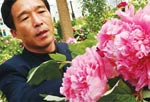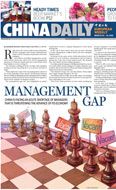Diplomatic and Military Affairs
Russia bans food imports from four Japanese prefectures
Updated: 2011-03-24 18:57
(Xinhua)
MOSCOW -- Russia has banned the importation of food products from four prefectures in Japan because of possible radiation contamination, health officials said Thursday.
Gennady Onishchenko, the chief public health official, said Russia has issued instructions on the ban of food products after March 11 from Japan's Fukushima, Ibaraki, Tochigi and Gunma prefectures.
"We are concerned chiefly about products of cultivation. According to the World Health Organization and Japan, the surface's contamination with radionuclides has been registered there," Onishchenko said. "Until the situation is fully clarified, we ban imports of products from these four prefectures."
| ||||
Radiation has seeped into raw milk, seawater and 11 kinds of vegetables, including broccoli, cauliflower and turnips, grown in areas around the plant.
The U.S. and Australia were halting imports of Japanese dairy and produce from the region, Hong Kong said it would require that Japan perform safety checks on meat, eggs and seafood, and Canada said it would upgrade controls on imports of Japanese food products.
Feverish efforts to get the nuclear plant's crucial cooling system back in operation have been beset by explosions, fire and radiation scares.
E-paper

Rise and shine
The Chinese solar energy industry is heating up following recent setbacks in the nuclear sector
Bombs aim for regime change
CSI, with a twist
Literary path
Specials

Peony express
Growers of china's unofficial national flower are reaching out to europe for help

Tea-ing up
More turning to Chinese tea for investment opportunities like vintage wine

A cut above
The ancient city of Luoyang is home to a treasure trove of cultural wonders.




